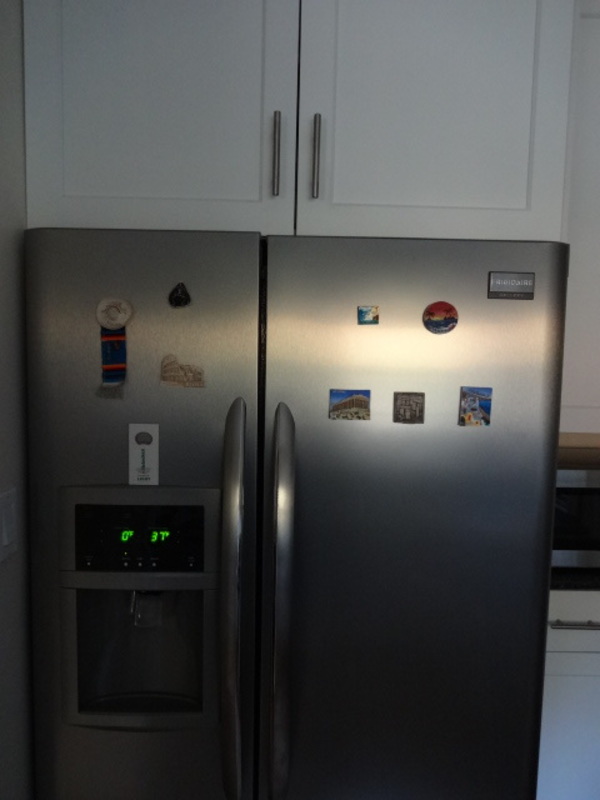
Jules Seeley, M.S., Physics graduate Strategy Consultant, London. So the answer is yes, the magnetic properties of stainless steel are very dependent on the elements added into the alloy, and specifically the addition of nickel can change the structure from magnetic to non-magnetic. Both the 18/8 and 18/10 are therefore austenitic. McMaster-Carr reports that 303 Stainless 'may become slightly magnetic when worked.' My interpretation would be that 'slightly magnetic' is more in the range of 'may screw with super-sensitive electronics' than 'macroscopic magnets will actually stick to it' so steel core gets my vote. The nickel is the key to forming austenite stainless steel. Like all ferromagnetic alloys, when heated to a high enough temperature. A ferritic stainless like 430 stainless steel, on the other hand, is ferromagnetic. Will Neodymium Magnets Stick To Stainless Steel - Manufacturers, Suppliers, Factory from China abide by the contract', conforms into the market requirement, joins in the market competition by its good quality also as provides a lot more comprehensive and great company for purchasers to let them turn into huge winner. Austenitic stainless steels like 304 or 316 stainless are good examples of this. It is the nickel which modifies the physical structure of the steel and makes it non-magnetic. The first number indicates 18 chromium, and the second 8 or 10 nickel. Some steels are only weakly magnetic, and some are not magnetic at all. However, the most common stainless steels are 'austenitic' - these have a higher chromium content and nickel is also added. These are formed from the addition of chromium and can be hardened through the addition of carbon (making them 'martensitic') and are often used in cutlery. A basic stainless steel has a 'ferritic' structure and is magnetic. There are several families of stainless steels with different physical properties. Specifically nickel is used to strengthen the oxide layer.Īs for whether they are magnetic, the answer is that it depends. In addition to chromium, other metals are added to give the steel particular properties such as strength and malleability. In general, the higher the proportion of chromium, the stronger the corrosion resistance of the steel. In plated steels, scratches in the plate will often lead to corrosion of the steel underneath. The advantage of stainless steels over plated steels is that, if scratched or damaged, the steel will 'self-repair' as a new oxide layer is formed. On the surface of the metal, a very thin chromium-rich oxide layer is formed which is inert - i.e. The chromium gives the steel its 'stainless' properties - essentially corrosion resistance. The name was adopted as a generic term for steel alloys with a minimum of 10.5% chromium.

Stainless steels are a very broad group of metals. The underlying difference is the arrangement of electrons in the inner core of the iron ions.Is stainless steel magnetic? Does it depend on the amount of chromium, or nickel alloy? In types classified as austenitic, this does not happen. In types of stainless classified as ferromagnetic, the structure allows tiny internal magnetic regions called domains to line up by polarity when exposed to a magnetic field. Whether a particular kind of stainless steel can be magnetized by exposure to a magnetic field depends on its crystalline structure, and that structure varies according to the various metallic additions to iron and sometimes according to temperature. What is known as 18/8 stainless steel, commonly found in cutlery, has 18 percent chromium and 8 percent nickel added to the iron and does not show magnetic properties at room temperature. In fact it may or may not be magnetic, it depends on the crystal structure of the stainless steel. Different combinations yield different degrees of different properties, like hardness, stress resistance and malleability. Answer (1 of 13): There’s a myth that stainless steel is inherently non magnetic. Depending on the intended use, some types also have varying amounts of nickel added, or other metals, like manganese or molybdenum. Stainless steel in general has significant amounts of chromium added to iron to improve its corrosion resistance. Whether or not magnets stick to black stainless steel also depends on whether the coating of the finish is thin enough to allow a magnet to cling to it.


The magnetic properties of stainless steel vary from alloy to alloy. Magnets will stick to black stainless steel if the steel at its core is ferromagnetic. While some common kinds of stainless steel are not attracted to a magnet, a magnet will stick to some other kinds.


 0 kommentar(er)
0 kommentar(er)
